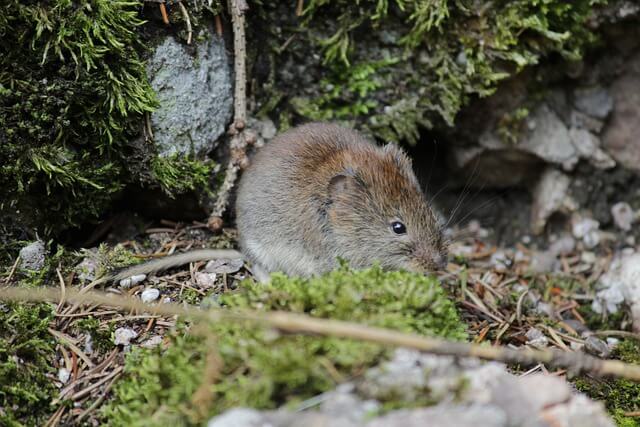Voles are troublesome yard pests that can destroy your gardens and wreck your lawn. Learn about these pests here and 10 quick tips you can do to prevent voles.
Table of Contents
Voles
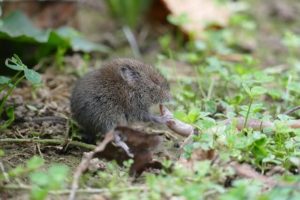
If you’re wondering about vole vs mole activity, voles leave trails and moles leave tunnels.
Voles are commonly called meadow mice or field mice. They have longer bodies than house mice, and feet shaped for crawling tunnels that moles dig. Voles are actually different from meadow mice or field mice, but they are very similar in lifestyle.
Voles are also similar to shrews, which are shorter and stubbier than house mice, though shrews and moles are in the same family.
A female vole can have 5 to 10 litters per year, with the ability to have nearly 100 young per year. However, though their reproductive rate is high, their mortality rate is high as well.
Voles can live up to a year, but many die with the first 3 to 6 months of life. The reason why voles don’t live long is due to predators seeking them out as food. For this reason, people often see signs of voles but don’t see the voles because they cannot spend much time in plain view.
Voles grow very quickly, with each gestation period lasting 3 weeks, a new vole can reach sexual maturity within 3 weeks as well.
These little rodents thrive on plant roots or any fruit or nut, but they have been known to eat other like animals if they are dead (mice, rats, etc.)
Did you know voles are relatives of hamsters.
In Your Yard
The first step needed before knowing how to prevent voles, is knowing whether you have voles or a different yard pest, like moles, chipmunks, gophers, etc.
You may be able to tell that you have voles from the trails they leave in the lawn, or their girdling of trees. Voles remove the bark of trees, tree branches, or exposed root, in a circular pattern.
If you’re wondering “what products kill voles?” mouse bait or poison will work, but we don’t always recommend using it, as this bait can be consumed by non-targeted species. Keep reading to learn the 10 quick tips you can do to prevent voles.
Voles love nuts and seeds, so peanut butter mixed with oatmeal or something similar will attract these pests. Keep this in mind if you are going to trap them yourselves.
So if you want to know “how do you get rid of voles in your yard?” Keep reading for 10 quick tips you can do to prevent voles. While seem similar in looks to a house mouse, if they ever get inside a home or structure, it is by accident. These are outdoor pests.
Vole control is vital to the health of your yard and garden.
Check out these pictures for common vole vs mole distinction:
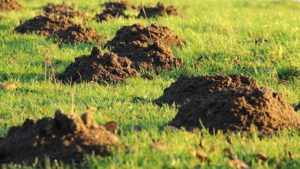
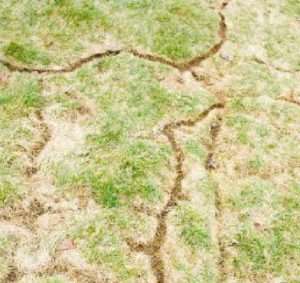
For other yard pests, check out this category within our blog.
10 Quick Tips You Can Do to Prevent Voles
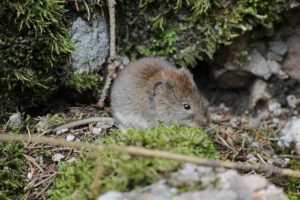
Voles can be destructive pests. If you’ve had these rodents in your yard before and you want to prevent them in the coming in your yard, try these 10 quick tips you can do to prevent voles. Implementing many of these can help you get rid of voles in your yard and prevent them for years to come.
-
- Maintain your yard. Voles like coverage, so tall grasses, tall weeds, bushes, etc. are great hiding spots where they feel safe from predators. As long as you keep mowing back tall grasses, trim bushes to the desired length, etc. voles won’t be as attracted to your yard.
- Remove any wood piles or store them in a manner that would not attract voles to nest in the wood pile area.
- Keep your mulch beds thin. If you use mulch to prevent weeds from growing, consider a dark mesh or cover under the mulch. Keeping the mulch at thinner intervals throughout your gardens will keep any voles away. They won’t be as secure walking through the mulch and won’t be attracted to that area of your yard. This will also help with millipede control.
- Since voles can wreak havoc in the winter under the snow, protect your trees and bushes with a protective guard around the base. This will deter the voles and they won’t be able to chew the bark off.
- Do not keep bird feeders, or make sure your bird feed is not accessible to voles and squirrels.
- Plant gravel around any bulbs in your garden. This will deter the voles from eating your garden.
- Dust the bulbs of your flowers with a fungicide dust. Voles do not like the smell or taste of the dust and the bulbs are less appealing to them.
- We don’t recommend using repellents as you will have to reapply them after a rain. If you do want to try some repellents and are willing to upkeep, we would suggest castor oil, which has had success in preventing moles and voles. You can also try to use spices like cayenne powder or garlic powder in their tunnels/burrows.
- If you have voles in your garden, they aren’t very good climbers, not compared to mice. Use raised garden beds, or install a mesh fence around your garden to prevent voles in your garden.
- Finally, if these options seem like too much work, get an outdoor dog or cat who can hunt these pests! If you do get an outdoor dog or cat, do not treat the voles with a poison or bait, as your pets could get the poison.
How We Treat Voles
When it comes to vole vs mole treatment, the options are very different. Though, at times, it doesn’t have to be. Moles we only use a carbon dioxide gas, no poison or bait. Voles we will often use a different approach.
Whenever possible, it is best to treat the burrows, where the voles nest. This is a source to exterminate a large part of the population. Treating the burrows is the most effective form of vole control.
We treat burrows with a carbon dioxide smoke that humanely kills any live in the burrows. We use secured stations where bait is housed for any leftover rodents to come and go.
We no longer have an individual vole service. We only offer seasonal vole control on an annual plan. Due to the voles being able to travel more than 3/4 of a mile, we cannot eradicate them from yards, but can control them using a variety of techniques that require consistent follow-up. We do have an add on service to our Peak Seasons Plan, in which we set up specific vole-only bait stations and use specific baits.
Keep in mind, any exterior pests are simply controlled, not exterminated completely because the outside is their home. We can’t completely get rid of them, but we can provide quality service and ensure a knockdown of the vole populations in your yard. For vole control done right, call Done Right Pest Solutions!
Conclusion & Next Steps
In this post you learned a bit about these quick breeding yard pests. You learned how voles like coverage and can strip some bark off of your trees. You learned 10 quick tips you can do to prevent voles. Vole control is vital to the health of your yard and garden.
If at any time, you want a professional opinion, or help smoking out vole burrows, give us a call. We would love to help get rid of these yard pests for you. 651-342-9489.
Your pest control experts,
Done Right Team
Have you ever had a problem with voles or field mice in your yard? They can be destructive! Share your experience below and whether or not you used any of the 10 quick tips you can do to prevent voles.
Want to learn more tips and tricks regarding pest control? Subscribe to our free email newsletter.

